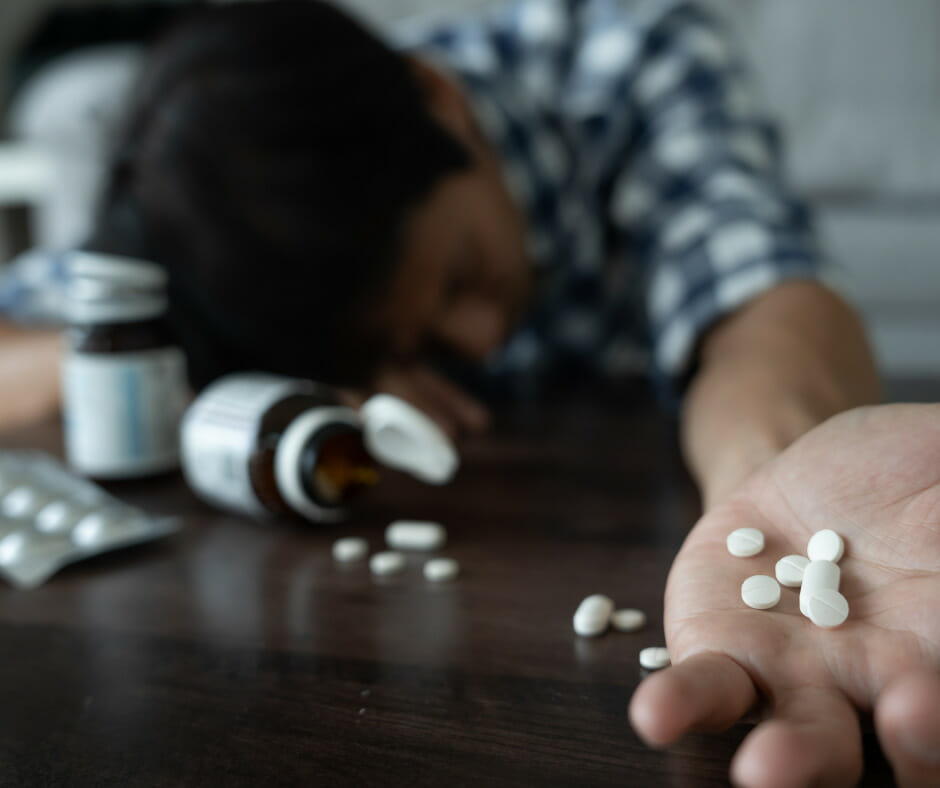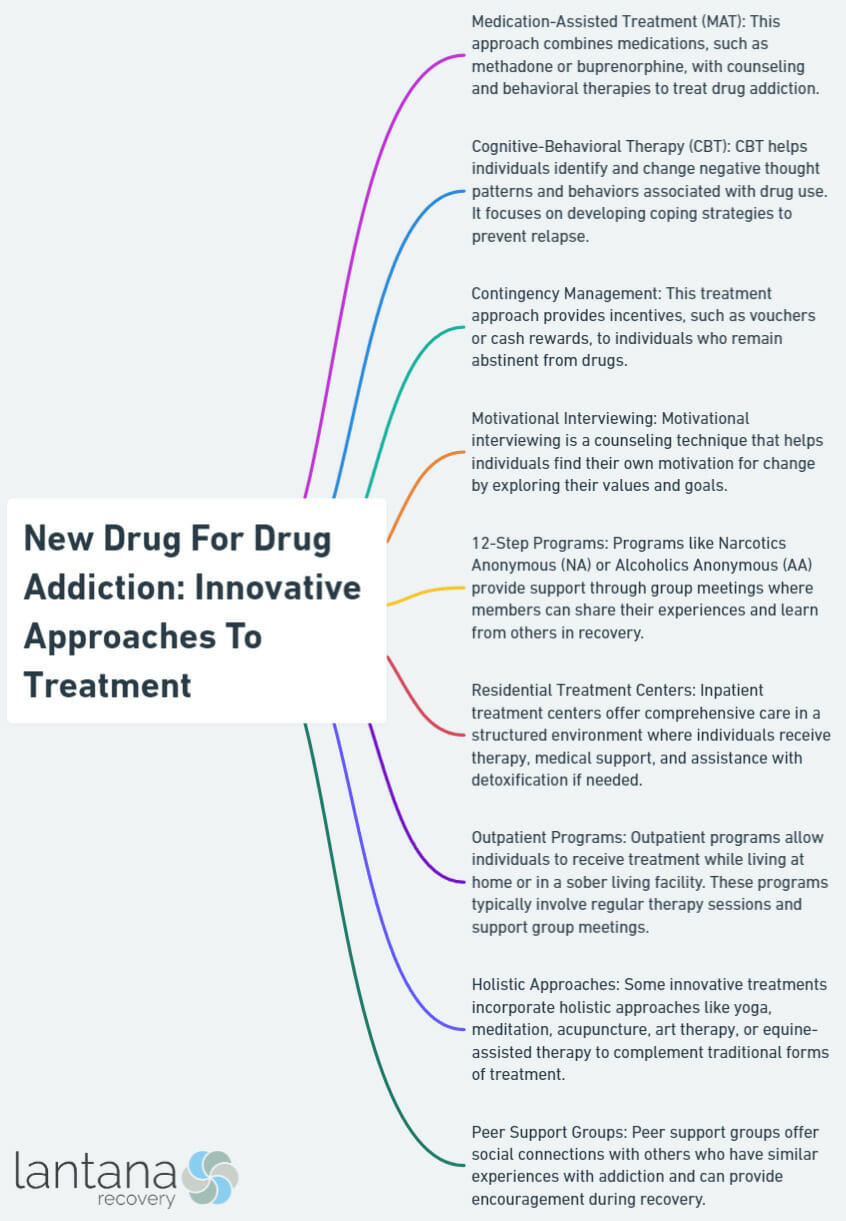Drug addiction is a complex and challenging issue that affects millions of individuals worldwide. Traditional approaches to addiction treatment, such as medication-assisted treatment and behavioral therapies, have shown some success but often have limitations. In recent years, there has been a growing need for innovative approaches to drug addiction treatment that can address these challenges and provide better outcomes for individuals struggling with addiction.
Understanding the nature of drug addiction and its challenges is crucial in developing effective treatment strategies. The factors contributing to addiction, including genetic, environmental, and psychological influences, make it a complex condition to treat. Current approaches, such as medication-assisted treatment (MAT), behavioral therapies, and support groups, have been valuable in managing addiction. However, there is a need to explore new treatment approaches that can better address the diverse needs of individuals with substance use disorders.
Advancements and innovations in drug addiction treatment offer promising possibilities for improved outcomes. Targeted medications that specifically address the underlying mechanisms of addiction show potential in reducing cravings and preventing relapse. Techniques like neurofeedback and brain stimulation hold promise in regulating brain activity and promoting healthier patterns. Virtual reality therapy has emerged as an innovative tool for providing immersive experiences that can aid in addiction treatment. Mobile health applications and telemedicine provide opportunities for accessible and remote care, ensuring ongoing support and monitoring for individuals in recovery.
While new drug addiction treatments offer potential benefits, there are also challenges to consider. Ensuring the efficacy and personalized nature of these treatments is crucial for success. Accessibility and affordability must be addressed to ensure that individuals from all walks of life can benefit from these innovations. Ethical considerations and a robust regulatory framework are essential to maintain the integrity and safety of these new treatment approaches.
The future of drug addiction treatment lies in a holistic approach that combines innovative interventions with comprehensive support systems. By addressing not only the physical aspects of addiction but also the psychological, emotional, and social factors, individuals can have a greater chance of successful recovery. Continued research and collaboration between healthcare professionals, researchers, and policymakers are key in harnessing the potential of innovative approaches to drug addiction treatment and making lasting positive changes in the lives of those affected by addiction.

Understanding Drug Addiction and Its Challenges
Drug addiction presents significant challenges that require a thorough understanding in order to develop effective prevention and treatment strategies.
- Stigma: The social stigma associated with drug addiction often prevents individuals from seeking help and leads to shame and isolation.
- Withdrawal Symptoms: When individuals quit using drugs, they may experience withdrawal symptoms ranging from mild discomfort to severe physical and psychological symptoms. The intensity and duration of withdrawal vary depending on factors such as the type of drug and the individual’s overall health.
- Co-occurring Mental Health Disorders: Many individuals struggling with drug addiction also have co-occurring mental health disorders, such as depression, anxiety, or trauma-related disorders. Treating both the addiction and the underlying mental health issues is crucial for successful recovery.
- Relapse: Drug addiction is a chronic condition, and relapse is a common challenge. Relapse rates for drug addiction are similar to those for other chronic illnesses, such as diabetes or hypertension. Viewing relapse as an opportunity for learning and adjusting treatment strategies is important.
- Lack of Access to Treatment: Accessibility to evidence-based treatment programs can be a significant challenge. Many individuals lack affordable treatment options, including medication-assisted treatment, outpatient drug rehab, and counseling services.
To address these challenges, it is crucial to prioritize education and awareness about drug addiction, reduce stigma, and ensure that comprehensive treatment options are accessible to all individuals in need. Additionally, investing in research to develop innovative approaches to prevention and treatment is essential for improving outcomes and reducing the impact of drug addiction on individuals and society.
Current Approaches to Drug Addiction Treatment
In the realm of drug addiction treatment, it’s essential to explore the current approaches that offer hope and recovery. Today, we’ll uncover different methods in tackling drug addiction – from medication-assisted treatment to the power of behavioral therapies and the strength found in support groups. Prepare to dive into the innovative solutions that are transforming lives and paving the way towards a brighter, addiction-free future.
Medication-Assisted Treatment
Medication-Assisted Treatment (MAT) is a evidence-based approach to treat drug addiction. It combines medication with counseling and behavioral therapies to address addiction.
- Medications: MAT uses FDA-approved medications to alleviate withdrawal symptoms, reduce drug cravings, and normalize brain function. These medications, like methadone, buprenorphine, and naltrexone, help individuals manage addiction and increase chances of successful recovery.
- Counseling: MAT includes counseling and psychosocial support as integral parts of treatment. These counseling sessions aim to address underlying causes of addiction, develop coping skills, and foster behavioral changes that support long-term recovery.
- Behavioral Therapies: Evidence-based behavioral therapies like cognitive-behavioral therapy (CBT) and contingency management are often combined with MAT to enhance treatment outcomes. These therapies help individuals understand addiction, identify triggers, and develop healthier coping strategies.
MAT has shown promising results in reducing illicit opioid use, overdose rates, and criminal behavior among individuals with opioid addiction. It has also been effective in improving treatment retention and overall well-being.
Behavioral Therapies
Behavioral therapies, such as Cognitive-Behavioral Therapy (CBT), Contingency Management (CM), Motivational Interviewing (MI), Dialectical Behavior Therapy (DBT), and Family Therapy, are crucial in treating drug addiction. These therapies modify a person’s thoughts, behaviors, and attitudes towards substance use to help them develop healthier coping mechanisms and positive changes in their lives.
- CBT helps individuals recognize and challenge negative thoughts and beliefs that contribute to drug use. It teaches them to develop healthier thinking patterns and coping strategies to avoid relapse.
- CM uses positive reinforcement to promote abstinence from drugs. Individuals are rewarded with incentives like vouchers or privileges for drug-free urine tests or treatment activities. CM has shown success in promoting abstinence and improving treatment outcomes.
- MI is a client-centered therapy that aims to enhance an individual’s motivation to change addictive behaviors. Therapists help individuals explore their ambivalence towards drug use and create a plan for change.
- DBT combines individual and group therapy to help individuals improve emotional regulation, interpersonal skills, and stress management. That is why DBT is particularly effective for individuals with co-occurring substance use and mental health disorders.
- Including the family in treatment through Family Therapy addresses the impact of addiction on family dynamics. It helps improve communication, rebuild trust, and create a supportive environment for recovery.
Behavioral therapies have been proven effective in reducing drug use, improving treatment retention, and enhancing overall well-being. Different individuals may respond better to certain therapies based on their specific needs and circumstances. It is crucial to consider individual preferences and tailor treatment plans accordingly.
Support Groups
Support groups are an integral part of treating and assisting individuals with drug addiction. These support groups provide a secure and comforting environment where individuals can openly share their experiences, receive empathy and encouragement, and learn from others who are facing similar challenges.
Emotional support is a significant aspect of support groups wherein individuals can freely express their emotions and receive understanding from others who have undergone similar experiences. Sharing knowledge and strategies is another critical aspect, as individuals can exchange valuable information about effective coping mechanisms, relapse prevention strategies, and additional resources for further assistance.
Building a sense of community is also vital within support groups. These groups connect individuals with others who can truly relate to their struggles, reducing feelings of isolation and fostering a strong sense of belonging. Accountability and motivation are other essential factors that support groups provide. Being a part of a support group encourages individuals to stay committed to their recovery goals and motivates them to overcome the challenges they may face along the way, recommends Tracy and Wallace in their study Benefits of peer support groups in the treatment of addiction, published in the journal Substance Abuse and Rehabilitation.
Furthermore, support groups serve as valuable platforms for individuals to learn from relapse stories. By hearing about the experiences of others who have dealt with relapse, individuals gain valuable insights and learn about triggers, thus empowering them to develop effective prevention strategies.
Let me tell you a true story about Jane, who battled addiction for many years and found immense help and support through a support group. Jane was able to open up about her struggles and receive guidance from individuals who had successfully overcome addiction. She also learned effective coping strategies through this group. The encouragement and accountability offered by the support group motivated Jane to adhere to her recovery plan and maintain her sobriety. Through the connections she made within the group, Jane built a network of supportive individuals who understood her journey even after leaving the support group.

The Need for New Drug Addiction Treatment Approaches
The need for new drug addiction treatment approaches is crucial in addressing the growing epidemic of drug addiction. Traditional approaches such as counseling and medication-assisted treatment have proven effective for many individuals. However, it is essential to explore innovative and alternative methods to meet the diverse needs of those struggling with addiction.
- Holistic Approach: A holistic approach takes into account the individual as a whole, addressing their physical, emotional, and spiritual aspects of addiction. This comprehensive approach enhances overall well-being and promotes long-term recovery.
- Targeted Interventions: Different drugs have unique effects on the brain and body. Therefore, treatment approaches should be tailored to specific substances to increase their effectiveness. For example, medications like buprenorphine have demonstrated great success in treating opioid addiction, while other treatments may be more effective for stimulant or alcohol addiction.
- Dual Diagnosis Treatment: Many individuals with drug addiction also suffer from co-occurring mental health disorders. Integrated treatment that addresses both addiction and mental health issues enhances outcomes and improves overall quality of life.
- Peer Support Programs: Peer support programs, such as Alcoholics Anonymous or Narcotics Anonymous, offer a supportive community of individuals who have faced similar struggles. These programs provide social support and ongoing encouragement throughout the recovery journey.
- Technology-Assisted Treatments: Advances in technology have resulted in innovative treatment approaches, including mobile apps, virtual therapy sessions, and wearable devices. These methods increase access to treatment and offer ongoing support for individuals in recovery.
Advancements and Innovations in Drug Addiction Treatment
Advancements in drug addiction treatment have opened up new possibilities for recovery. Let’s explore some innovative approaches that are transforming the landscape of treatment. From targeted medications to neurofeedback and brain stimulation, virtual reality therapy, and mobile health applications, these breakthroughs are giving individuals struggling with addiction a fighting chance. Get ready to discover the cutting-edge methods that are reshaping addiction treatment and offering hope for a brighter future.
Targeted Medications
Targeted medications are essential in the treatment of drug addiction. These medications specifically target the mechanisms and effects of substance abuse. Here are some important points to know about targeted medications:
- Pharmacological precision: Targeted medications directly interact with specific receptors or enzymes in the brain, modulating neurotransmitter systems involved in addiction.
- Reduced cravings and withdrawal symptoms: Targeted medications effectively manage cravings and alleviate withdrawal symptoms. For instance, buprenorphine and methadone normalize brain function and suppress withdrawal symptoms in opioid addiction treatment.
- Prevention of relapse: Targeted medications block the effects of drugs or reduce their rewarding properties, resulting in lower relapse rates. Naltrexone, an antagonist medication, effectively reduces relapse rates among individuals with opioid addiction by blocking opioid receptors.
- Individualized treatment: Healthcare professionals tailor targeted medications based on the individual’s needs, substance abuse history, and co-occurring mental health disorders.
- Complementary approach: Targeted medications are used in conjunction with behavioral therapies and support groups to enhance treatment outcomes and foster long-term recovery.
Pro-Tip: When seeking treatment for drug addiction, it is advisable to consult with healthcare professionals who specialize in addiction medicine. They can assess your unique circumstances and recommend the most suitable targeted medication for your recovery journey.
Neurofeedback and Brain Stimulation
Neurofeedback and brain stimulation are innovative approaches in treating drug addiction that improve outcomes for individuals struggling with addiction.
- Neurofeedback: This involves using feedback to train individuals to regulate their brain activity. It helps individuals gain awareness and control over their brainwaves, leading to improved self-regulation and emotional stability. Neurofeedback is effective in addressing underlying issues such as anxiety, depression, and impulsivity, which often coexist with drug addiction.
- Brain Stimulation: This approach stimulates specific regions of the brain associated with addiction. For example, according to a study, “Compulsive drug use emerges due to a loss of prefrontal cortical inhibitory control over drug-seeking habits.” (Neural and psychological mechanisms underlying compulsive drug seeking habits and drug memories – indications for novel treatments of addiction, Barry J. Everitt, 2014)
Transcranial magnetic stimulation (TMS) and transcranial direct current stimulation (tDCS) are commonly used methods. TMS uses magnetic fields to stimulate targeted brain areas, while tDCS delivers low levels of electrical current to modulate brain activity. These techniques reduce cravings, improve mood, and enhance cognitive functioning. - Combined Approach: Neurofeedback and brain stimulation can be used with medication-assisted treatment and behavioral therapies to enhance addiction treatment. By targeting the brain’s neural circuits involved in addiction, these approaches rewire and rebalance brain function, promoting lasting recovery.
- Individualized Treatment: Neurofeedback and brain stimulation can be tailored to the individual’s specific needs. The treatment can be adjusted based on the individual’s brain activity patterns and response, ensuring a personalized approach that maximizes therapeutic benefits.
- Potential Limitations: Further research is needed to fully understand the long-term efficacy and potential side effects of neurofeedback and brain stimulation. Limited accessibility to these treatments due to cost and availability may also be a challenge. However, advancements in technology and increased awareness may lead to greater accessibility in the future.
These innovative approaches of neurofeedback and brain stimulation offer new possibilities in treating drug addiction, providing hope for improved outcomes and enhanced recovery for individuals seeking help.
Virtual Reality Therapy
Virtual Reality Therapy is an innovative and powerful tool in the treatment of drug addiction. By harnessing the immersive capabilities of virtual reality technology, it creates an environment that is both therapeutic and effective for individuals seeking help in their journey towards recovery.
One of the key components of Virtual Reality Therapy is exposure therapy. Through this approach, individuals are exposed to drug-related cues and triggers in a controlled virtual environment. This exposure enables them to develop effective coping strategies and resist cravings when faced with real-life situations.
Skills training is another crucial aspect of Virtual Reality Therapy. By providing simulated scenarios, individuals have the opportunity to practice and refine the skills and behaviors necessary for their recovery. This includes learning and implementing relapse prevention techniques, improving communication skills, and mastering stress management techniques.
Emotion regulation is also addressed through the use of virtual reality technology. Therapists are able to create situations that induce various emotional states, allowing individuals to learn how to regulate their emotions and effectively cope with anxiety, stress, and cravings. This invaluable skill set is developed within a safe and controlled setting.
Moreover, Virtual Reality Therapy promotes empathy and understanding among individuals in treatment. By experiencing the consequences of their actions through the perspective of others, individuals develop a greater sense of empathy towards themselves and those impacted by addiction.
It is worth noting that Virtual Reality Therapy is most effective when utilized alongside other evidence-based therapies and support systems. It is crucial to work with a qualified healthcare professional who can tailor the therapy to meet individual needs and goals.
Mobile Health Applications and Telemedicine
Mobile health applications and telemedicine are revolutionizing drug addiction treatment by providing support, monitoring, and intervention.
These innovative technologies connect individuals with support groups, counselors, and recovery coaches, enabling real-time communication and assistance.
Additionally, these apps can track an individual’s progress in recovery by integrating wearable devices or inputting self-reported data, allowing healthcare providers to intervene promptly and adjust treatment as needed.
Furthermore, these mobile applications provide educational materials, interactive tools, and informative videos to enhance understanding and empower individuals in making informed decisions about treatment.
Through telemedicine, individuals can access virtual consultations with addiction specialists, therapists, and physicians, eliminating barriers such as travel distance, time constraints, and stigma.
Moreover, these mobile health applications incorporate features like push notifications, reminders, and coping strategies to help individuals manage cravings, triggers, and stressful situations, thereby cultivating coping skills and self-control.
Overall, mobile health applications and telemedicine are game-changers in drug addiction treatment, offering immediate support, personalized monitoring, convenient education, and accessible interventions.

Potential Benefits and Challenges of New Drug Addiction Treatments
Innovative approaches to drug addiction treatment hold immense potential in revolutionizing how we tackle this widespread problem. In this section, we will explore the potential benefits and challenges of these new treatment options. From improved efficacy and personalized treatment strategies to increased accessibility and affordability, these groundbreaking approaches have the power to reshape the landscape of addiction treatment. So, buckle up and get ready to dive into the exciting realm of new drug addiction treatments and the possibilities they bring.
Improved Efficacy and Personalized Treatment
Improved efficacy and personalized treatment are crucial in drug addiction treatment. By incorporating targeted medications, neurofeedback, virtual reality therapy, and mobile health applications, drug addiction treatment can be more effective and tailored.
Targeted medications, such as buprenorphine and methadone, can reduce withdrawal symptoms and cravings in opioid or treating prescription drug addiction. Neurofeedback and brain stimulation can enhance treatment outcomes by targeting areas associated with addiction and promoting healthier patterns. Virtual reality therapy allows individuals to develop coping mechanisms in controlled settings, reducing cravings and preventing relapse. Mobile health applications and telemedicine provide remote access to resources and support, empowering individuals in their recovery. Personalization is key to addressing addiction’s complexity and maximizing treatment outcomes.
Accessibility and Affordability
Accessibility and affordability are crucial for drug addiction treatment. Here are some important points:
- Financial assistance programs: Treatment centers offer programs to make treatment more accessible and affordable for individuals who cannot pay. These programs cover treatment costs or offer sliding scale fees based on income.
- Insurance coverage: Check with your insurance provider to understand what drug addiction treatment services are covered. Some plans fully or partially cover the cost, making it more affordable.
- Publicly funded treatment programs: Government agencies and non-profit organizations provide low-cost or free treatment for individuals who cannot afford private treatment.
- Telemedicine options: Virtual doctor visits and therapy sessions offer accessible and affordable drug addiction treatment from home, eliminating travel costs.
Sarah, a single mother, struggled with addiction for years. She wanted treatment but worried about the cost. With a financial assistance program from a local treatment center, Sarah accessed affordable treatment. The program made a significant difference, ensuring accessibility and affordability were not barriers to her recovery.

Ethical Considerations and Regulatory Framework
When developing and implementing new drugs for drug addiction treatment, ethical considerations and a strong regulatory framework are crucial. Here are key points to consider:
- Informed consent: Ensure participants in clinical trials fully understand the risks and benefits of participating by obtaining informed consent based on ethical guidelines.
- Safety and efficacy: Conduct rigorous testing and evaluation to determine the safety and efficacy of new drugs before making them available to the public. This includes comprehensive preclinical studies and well-designed clinical trials with diverse participants.
- Confidentiality and privacy: Prioritize protecting patients’ privacy and confidentiality throughout the drug development process. Maintain strict adherence to privacy laws and handle sensitive information securely.
- Equity and accessibility: Make new drug treatments accessible to all individuals who could benefit from them, regardless of socio-economic status or demographic factors. Consider how to ensure equitable access to prevent exacerbating health disparities.
- Oversight and regulation: Establish a robust regulatory framework to monitor the development, production, and distribution of new drugs for drug addiction treatment. Regulatory agencies play a crucial role in evaluating safety, quality, effectiveness, and enforcing ethical standards.
Suggestions:
- Foster collaboration between researchers, regulatory agencies, and ethics committees to develop comprehensive guidelines and standards for drug addiction treatment.
- Continuously evaluate and update the regulatory framework to adapt to emerging issues and advancements in drug addiction treatment.
- Increase public awareness and education about ethical considerations and regulatory processes involved in drug addiction treatment to promote transparency and understanding.
- Encourage the involvement of diverse stakeholders, including patients, in decision-making processes related to drug addiction treatment to address ethical concerns and regulatory aspects adequately.
- Facilitate international collaboration and harmonization of ethical and regulatory standards to enhance the global effort in addressing drug addiction effectively and ethically.

The Future of Drug Addiction Treatment: A Holistic Approach
The future of drug addiction treatment lies in adopting a holistic approach that addresses the physical, mental, and emotional aspects of addiction. By integrating various methods and therapies, we can provide comprehensive and personalized care for individuals struggling with drug addiction.
- Medical Detoxification: Cleansing the body of drugs under medical supervision is an essential first step. This process helps manage withdrawal symptoms and ensures a safe transition to recovery.
- Psychotherapy: Individual and group therapy sessions allow individuals to explore the underlying causes of their addiction, develop coping strategies, and enhance their emotional well-being.
- Pharmacotherapy: Medications can reduce cravings, manage withdrawal symptoms, and prevent relapse. Combining these medications with therapy can significantly improve treatment outcomes.
- Alternative Therapies: Incorporating practices like acupuncture, yoga, meditation, and art therapy can provide individuals with extra tools to manage stress, promote relaxation, and enhance well-being. These unique therapies can enhance self-esteem and self-confidence of those in recovery, suggests the study A holistic approach to substance abuse treatment published in Journal of Psychoactive Drugs by Kathy T Breslin and her colleagues.
- Support Network: Building a strong support network is crucial for long-term recovery. This can be achieved through participation in support groups, engaging with peers, and involving loved ones in the recovery process.
- Aftercare Planning: Developing a personalized aftercare plan ensures ongoing support and access to resources after treatment. This may include continued therapy, support group meetings, and vocational training.
Inspiring Story: Sarah, a young woman who struggled with drug addiction, found hope and healing through holistic treatment. By addressing her physical, mental, and emotional needs, she broke free from addiction and rediscovered her purpose in life. Through therapy, medication, and alternative therapies, Sarah gained self-awareness, built a strong support network, and learned coping skills. Today, she advocates for holistic addiction treatment and inspires others on their recovery journey.

Frequently Asked Questions
1. What is the significance of NIDA-supported research in the treatment of substance use disorders?
NIDA-supported research has been instrumental in developing effective interventions for treating substance use disorders and overdose. This includes medications, behavioral interventions, and digital therapeutics. NIDA continues to support research to develop safe, effective, and desirable treatment strategies with long-term goals in mind.
2. How does NIDA fund research for increasing access to evidence-based treatment?
NIDA funds research aimed at increasing access to evidence-based treatment tailored for specific populations, such as adolescents, people in justice settings, and those with other mental health concerns. This funding helps develop and implement treatment strategies that are effective and tailored to the needs of diverse populations.
3. What should I expect when seeking treatment at an addiction treatment center in South Carolina?
When you decide to seek treatment at an addiction treatment center in South Carolina, you can expect a comprehensive and personalized approach to your recovery. Addiction treatment centers in South Carolina offer a variety of evidence-based therapies, such as cognitive-behavioral therapy (CBT), motivational enhancement therapy (MET), and dialectical behavior therapy (DBT). These therapies help you understand and manage the underlying causes of addiction.
4. What are some of the treatment innovations being developed by Indivior?
Indivior is developing RBP-6000, a new sustained-release buprenorphine formulation that has shown promising results in reducing illicit opioid use. They are also working on a novel prodrug of baclofen for the treatment of alcohol use disorder and a sustained-release formulation of risperidone for the long-term treatment of schizophrenia. Their research aims to enhance treatment adherence, improve overdose management, and address the comorbidities of addiction.
5. How does Indivior aim to change societal attitudes toward addiction and improve access to treatment?
Indivior invests in health economics and outcomes research to understand patient outcomes beyond clinical efficacy and safety. They believe that a deep understanding of the neurobiological underpinnings of addiction, as well as partnerships and collaborations, are crucial in developing new medications and addressing the unmet needs of patients. They are committed to offering innovative solutions and widening access to quality treatments.
6. What are the key goals of Indivior’s research and development mission?
Indivior’s research and development mission focuses on stabilizing drug delivery, decreasing dosing frequency, increasing treatment adherence and retention, decreasing diversion and misuse, improving overdose management, and treating the comorbidities of addiction. They aim to develop therapeutics that improve patient outcomes and ultimately reduce and cease drug use, addressing the global human crisis of addiction.









